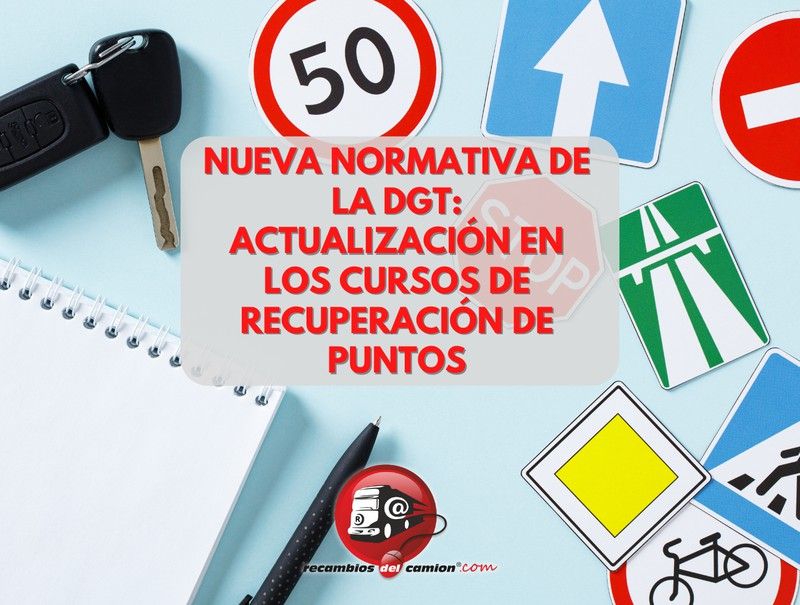New DGT regulations: updates on points recovery courses
The General Directorate of Traffic (DGT) has introduced significant changes to both partial and full driving license point recovery courses. These reforms, which came into effect on November 4, 2024, seek not only to modernize the system but also to make it more effective in re-educating offending drivers, with the goal of reducing road accidents. Below, we explain everything you need to know about these modifications.

One of the most notable aspects of the new courses is the reduction in the maximum number of points that can be recovered. Before this reform, drivers could recover up to six points by taking a partial recovery course. However, this figure has now been reduced to a maximum of four points.
The intention of this measure is clear: to increase driver responsibility behind the wheel. By limiting the number of recoverable points, the aim is to deter drivers from committing repeated violations and encourage greater respect for traffic rules. In this context, point recovery becomes a more rigorous re-education tool, rather than a simple solution to recovering the point balance.
Another significant change is the mandatory inclusion of traffic accident victims in the courses. These individuals will share their personal experiences to raise awareness among drivers about the consequences of reckless behavior.
This approach seeks to generate a deep emotional impact on participants, promoting greater empathy and awareness of the risks associated with certain behaviors. Hearing real testimonies from victims can be a powerful catalyst for changing the attitudes of offending drivers, helping them understand that every action on the road has real and, often, devastating repercussions.
Distracted driving has become one of the leading causes of accidents in Spain. Therefore, the new courses place special emphasis on this topic, addressing in depth the dangers of using mobile phones and other electronic devices while driving.
In addition, other risk factors are covered, such as alcohol and drug use, driver fatigue, and excessive speed. The idea is to provide drivers with the necessary tools to identify and avoid these behaviors, promoting safer driving.
One of the major new features is the customization of courses based on each offender's profile. It's no longer about offering generic training for all drivers, but rather adapting the content to the offenses committed and the specific re-education needs of each participant.
For example, a driver who has lost points for driving under the influence of alcohol will receive specific training on the risks and consequences of this behavior, while another who has committed offenses related to mobile phone use will focus on distracted driving.
Digitalization is also reaching point recovery courses. The DGT (Directorate-General for Traffic) has incorporated new technologies to improve the learning experience for drivers. This includes the use of interactive tools, driving simulators, and digital resources that make the content easier to understand.
Furthermore, online training is also gaining prominence, allowing drivers to access certain content from anywhere. However, practical sessions and more sensitive activities will continue to be conducted in person to ensure effective learning.
The length of the courses has also been revised. Partial point recovery courses now last 10 hours, while full license recovery courses have been extended to 20 hours.
Each course combines standard and specific sessions, designed to address the areas that require the most attention in each particular case. For example, road safety awareness sessions, risk behavior analysis, and strategies for adopting safer driving are included.
With these changes, the DGT seeks to update the points recovery system to adapt it to the current needs of society and the challenges of modern mobility. The inclusion of accident victims and the customization of content reflect a more humane and practical approach, focused on prevention and education as fundamental tools for reducing accidents.
Furthermore, the reduction in recoverable points and the longer duration of the courses send a clear message: road safety is a serious process that requires time and commitment from drivers. These reforms are designed to make offenders aware of the seriousness of their actions and adopt a more responsible attitude on the road.
The changes introduced to traffic ticket recovery courses represent a step forward in the quest for safer and more responsible mobility in Spain. The combination of awareness, personalized training, and the use of innovative technologies has the potential to make a significant difference in driver behavior.
It is important that all drivers are aware of these changes and informed about the new rules to avoid surprises and stay up to date with the regulations. Furthermore, this new approach underscores the importance of ongoing training, not only as an obligation, but as an opportunity to improve our skills and contribute to a safer road environment for all.





Opinions of our clients
Receive our news